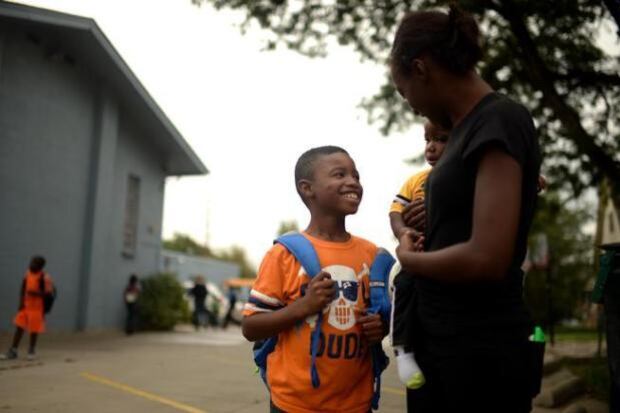Parents in Denver could end up with easy access to a host of information about their children’s schools, from how many students were suspended to whether the buses ran on time. Or they could end up with a simplified version of what exists now: a school rating system that largely relies on standardized test scores.
A year after a committee set out to reimagine Denver Public Schools’ controversial school rating system, the Denver school board is divided over the next steps. The decision represents a test of how a new board majority will approach school choice policy in a district that has long prided itself on making it easy for parents to choose.
At the heart of the debate is whether information empowers parents or fosters unhealthy competition and comparison among schools.
“What I’m worried about is how parents could weaponize this data,” said school board member Scott Baldermann, who represents southeast Denver.
The idea for an information dashboard came from a committee of 30 parents, teachers, principals, and community members who spent nine months coming up with three recommendations for revising the district’s school performance framework, or SPF.
All seven school board members appear to support a recommendation to get rid of the current rating system, which has been criticized as confusing and costly. Instead, Denver would use more simplified school ratings developed by the state education department.
Every other Colorado district already uses the state’s ratings, which are free to districts. Districts and the state use the ratings to determine which schools are struggling and need intervention.
But the board members are divided on two other recommendations. Three board members support the idea of an information dashboard, along with a recommendation to use “a robust body of evidence” — read: not just standardized test scores — to diagnose schools’ challenges.
Four others either do not support a dashboard or are undecided. That means a decision could go either way; a majority of the seven must vote yes to move forward to a second phase where the details of the dashboard would be developed. The board is scheduled to vote on Aug. 20.
District administrators have made clear that they’d like to honor the committee’s recommendations. At a recent public meeting, Superintendent Susana Cordova said that if the district adopts the state ratings but doesn’t produce a dashboard, test scores will be the main public-facing metric by which parents can judge schools.
For example, she said parents won’t know how many students at a high school are taking college-level courses or how many earned a “seal of biliteracy” signifying that they can read and write in two languages. Those are also important data points, she said.
Board members Carrie Olson, Angela Cobián, and Barbara O’Brien agree.
“We want to stop the practice of a school being boiled down to only a color-coded rating,” board President Olson said in a statement.
Olson referenced a recent report from RootEd, an organization focused on educational quality and equity. RootEd has funded Denver charter and innovation schools, as well as community organizations. The report authors asked Denver parents which information they rely on to make school decisions — and which information they wish they had.
In addition to academic data, parents who participated said they want to know about a school’s culture: What is its approach to discipline? Do teachers stay year after year? Are there police at the school?
“It’s important to let parents know what the school is like,” said Antwan Jefferson, one of the report authors and a Denver parent himself. “Metrics don’t tell you that. They don’t tell you how the school feels. They don’t tell you if your child will be punished for talking too much in class.”
Board Vice President Jennifer Bacon has not explicitly said how she’d vote on a dashboard. Bacon said she wants parents to have access to information about their schools, especially low-income parents whose children have not always been well served. At the same time, she’s wary of how data has been used in the past. Ideally, parents wouldn’t have to make choices, she said, because every school would be high quality.
“Where I am on the dashboard is I want to work with everyone to actually walk our talk in moving off of this competitive model,” Bacon said at a recent school board meeting. “We need to do everything we can to level this playing field.”
Three other board members — Baldermann, Brad Laurvick, and Tay Anderson — have expressed reservations about a dashboard. Baldermann said he’s worried it reinforces the idea that schools should compete and parents should shop around.
“It’s going to drive competition and create winners and losers,” he said.
Anderson said he shares those concerns and is also worried that some parents were left out of the conversation. He suggested the board table a vote on the dashboard. Anderson said he’s still undecided.
The vote has already been delayed once. It was originally set for June, but the board postponed it to this month after parents with the advocacy organization Stand for Children and others asked the district to pause the school ratings discussion amid the coronavirus pandemic.
Stand for Children has since come out in favor of a dashboard.
“A dashboard designed by the community will provide the information parents and staff want to see,” parent Sarah Titus wrote in an op-ed for the Front Porch community newspaper.
Laurvick has said he’s a “not yet” on the dashboard. He’d like the district to first cement its definition of equity — an elusive goal the district has been working toward for some time — and develop a new master plan before approving the idea of a dashboard.
The Denver teachers union hasn’t supported the idea of a dashboard, either. The union’s board of directors voted to support the 30-member committee’s first recommendation to use the state’s ratings, but did not vote on whether to support the other two.
Committee member Karen Mortimer said she was blindsided by the pushback. The purpose of a dashboard would be to paint a broader picture of how schools are — or are not — serving students, not rank or shame them, said Mortimer, a parent of two Denver students.
She also thinks the district can put parameters around how schools use the data in the dashboard. “There is room for the district to get ahead of this and put things in place to say, ‘Schools, that’s not acceptable. You can talk up your strengths. But don’t rank yourself against any other school. You share your own story,’” Mortimer said.
Veteran Denver teacher Priscilla Shaw Rahn disagrees that the committee didn’t take diverse views into account. Shaw Rahn said the process also felt authentic; there was lots of disagreement among members but a majority supported the recommendations.
“We need the school board to say, ‘Yes, conceptually, this is a good idea,’” she said.
Some board members said there’s another good reason to do that, too. In a district with a history of being distrusted by the community, ignoring recommendations that a community committee spent nine months developing does little to rebuild trust, they said.
“When those groups come to us with recommendations, it’s incumbent upon us to listen,” Cobián said.
Clarification: This story has been updated to reflect that board member Tay Anderson is undecided on how he’ll vote on a dashboard.






